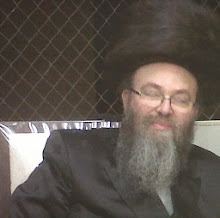
Friday, April 24, 2009
ETZ L'SHLIACH - Rabbi Avraham Chachamovits's new book in English

Tuesday, April 21, 2009
It is forbidden for a Jew to work on Shabbat. What is the esoteric reason for this prohibition?
During the regular weekdays, there are spiritual forces that descend to our world’s level of reality in order to allow that tikkunim (“rectifications”) be made into effect through the permitted works to a Jew. In a more specific manner, every permitted work done during the week serves, in a way or another, to raise netzuzin kedoshim (“Divine sparks”) fallen in the physical level when the order of reality was not our current order of rectification, the Olam HaTikkun, but rather, the preceding order of the Olam HaTohu (“World of Chaos”). The order of the Olam HaTohu was broken apart, so to speak, through a deep and fundamental process of the Divine plan for the revelation and ultimate evolution of Creation, particularly man, as it is taught by the Ari”zal.
However, as nothing can be elevated on Shabbat, these forces become as ‘forces in vain’, chaz v’shalom. Through this, the klipot, the negative forces that block the revelation of Divinity in the material world, can steal these spiritual powers, this holy light, and make use of them for its own negative uses, chaz v’shalom. Moreover, the klipot are called the “power of death”, and when the Jew profanes the Shabbat through some forbidden work, he receives the celestial decree of punishment through death, chaz v’shalom, since, worse than not using these forces for the elevation of fallen sparks, is the fact that they may fall under the domain and “clutches” of the klipot. This has the effect of literally nourish the klipot and sitra achra, the person then becoming a “partner of evil”, may Hashem have mercy on his soul. This nourishment has the additional effect of blocking the benefiting purpose of the Or Ayin Sof, thus causing a diminution of spiritual shefa (“flux of blessings”) to the world at large. This has the further effect of causing severe decrees (in the form of afflictions) to befall the person (and those close to him) who performed the transgression, the community, and the whole world, chaz v’shalom.
